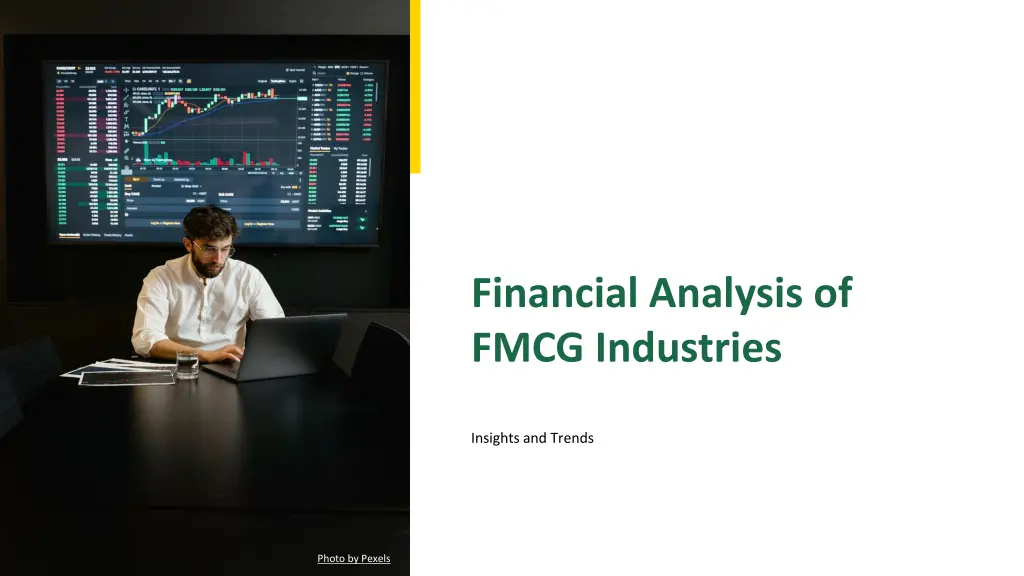
Financial Analysis Insights for FMCG Industries
Discover valuable insights into the financial analysis of FMCG industries, covering supply chain dynamics, cost management, sales performance evaluation, net sales insights, warehousing efficiency, and the impact of technology on the supply chain. Explore trends and strategies to enhance profitability and efficiency in the FMCG sector.
Download Presentation

Please find below an Image/Link to download the presentation.
The content on the website is provided AS IS for your information and personal use only. It may not be sold, licensed, or shared on other websites without obtaining consent from the author. If you encounter any issues during the download, it is possible that the publisher has removed the file from their server.
You are allowed to download the files provided on this website for personal or commercial use, subject to the condition that they are used lawfully. All files are the property of their respective owners.
The content on the website is provided AS IS for your information and personal use only. It may not be sold, licensed, or shared on other websites without obtaining consent from the author.
E N D
Presentation Transcript
Financial Analysis of FMCG Industries Insights and Trends Photo by Pexels
01 Understanding Supply Chain Dynamics Table of Contents 02 Managing Costs Effectively 03 Sales Performance Evaluation 04 Net Sales Insights 05 Warehousing Efficiency 06 Impact of Technology on Supply Chain 07 Sustainability in FMCG 08 Economic Factors Influencing FMCG 09 Competitive Landscape Analysis 10 Thank You for Your Attention
1 Understanding Supply Chain Dynamics Flow of Goods Supply Chain is crucial in FMCG, affecting efficiency and profitability. It involves sourcing, production, and distribution of products. A well-managed supply chain reduces costs and enhances service levels. Trends show increasing reliance on technology in supply chain management. Photo by Pexels
2 Managing Costs Effectively Cost Control Strategies Cost management is pivotal in FMCG for maintaining competitive pricing. It includes direct costs like raw materials and indirect costs such as logistics. Efficiency in operations can significantly lower overall expenses. Regular financial audits help identify and eliminate unnecessary costs. Photo by Pexels
3 Sales Performance Evaluation Measuring Success Sales figures are key indicators of market health in FMCG industries. Analyzing trends helps in forecasting and strategic planning. Regular reviews of sales performance guide marketing efforts. Understanding customer preferences drives sales growth. Photo by Pexels
4 Net Sales Insights Revenue Analysis Net sales reflect the actual revenue generated after returns and discounts. It's essential to analyze net sales for understanding profitability. Comparing net sales quarter-over-quarter reveals growth patterns. Effective pricing strategies can enhance net sales outcomes. Photo by Pexels
5 Warehousing Efficiency Storage Solutions Warehousing plays a critical role in the FMCG supply chain. Efficient warehousing reduces overstock and stockouts, optimizing costs. Technological advancements enhance tracking and inventory management. Strategic location of warehouses can improve distribution speed. Photo by Pexels
6 Impact of Technology on Supply Chain Digital Transformation Integrating technology in supply chains enhances data visibility. Automation and AI can streamline processes and reduce human error. Analytics allow for better demand forecasting and inventory control. Embracing e-commerce trends can expand market reach. Photo by Pexels
7 Sustainability in FMCG Green Practices Sustainable practices are becoming essential for FMCG companies. Eco-friendly sourcing and packaging attract environmentally conscious consumers. Sustainability can lead to cost savings in the long run. Transparency in sourcing builds consumer trust. Photo by Pexels
8 Economic Factors Influencing FMCG Market Dynamics Economic trends directly impact consumer behavior in FMCG markets. Inflation, employment rates, and disposable income affect sales. Adapting to economic changes is crucial for strategic planning. Monitoring economic indicators can guide investment decisions. Photo by Pexels
9 Competitive Landscape Analysis Market Positioning Understanding competitors is vital for strategic positioning in FMCG. Market share analysis helps identifygrowth opportunities. Highlighting unique selling propositions strengthens market presence. Continuous monitoring of competitors is essential for success. Photo by Pexels
10 Thank You for Your Attention We Appreciate You Thank you for exploring the financial analysis of FMCG industries. We hope you found valuable insights and engaging content. Your feedback is essential for us to improve our presentations. Let s continue to drive innovation and success together. Photo by Pexels
